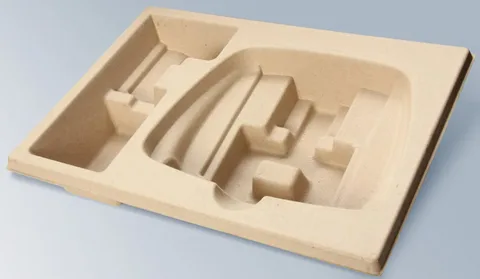As sustainability becomes a primary focus for businesses around the world, companies are exploring environmentally friendly alternatives to traditional packaging materials. One of the most promising solutions to reduce environmental impact and align with green initiatives is molded fiber. Derived from recycled paper, molded fiber offers a sustainable packaging option that is both cost-effective and biodegradable. This article explores why molded fiber is an ideal choice for businesses looking to enhance their green packaging strategies.
Eco-Friendly and Sustainable Nature of Molded Fiber
The production of molded fiber involves using renewable and recycled materials, making it a highly eco-friendly option. Made primarily from paper pulp, molded fiber can be sourced from post-consumer recycled paper or agricultural by-products, which means it doesn’t require the consumption of virgin resources. This significantly reduces the environmental footprint of the manufacturing process. Additionally, molded fiber is 100% biodegradable, meaning it breaks down naturally over time without harming the environment, unlike plastic alternatives that persist for centuries in landfills.
Moreover, the production of molded fiber typically requires less energy than plastic or metal alternatives. Manufacturers often use water-based adhesives, avoiding toxic chemicals in production processes. As a result, molded fiber not only minimizes carbon emissions but also prevents the release of hazardous substances into the environment. For companies aiming to reduce their carbon footprint and meet sustainability goals, adopting molded fiber as a packaging material can be a game-changer.
Durability and Protection for Products
Despite being made from paper pulp, molded fiber is a surprisingly durable material that offers excellent protection for fragile products. The unique structure of molded fiber allows it to absorb shocks and impacts, making it an ideal choice for packaging products such as electronics, cosmetics, and food items. The material’s strength ensures that it can withstand the rigors of shipping and handling, providing a secure environment for the items inside.
Additionally, molded fiber can be molded into a wide variety of shapes and sizes, offering flexibility in packaging design. Whether you need a tray, clamshell, or insert, molded fiber can be easily adapted to fit the exact specifications required for your product. This customization allows businesses to create packaging solutions that not only protect their goods but also showcase their commitment to sustainability. By choosing molded fiber, businesses ensure that their products are safely packaged while promoting an eco-conscious image.
Cost-Effectiveness of Molded Fiber Packaging
While the initial cost of molded fiber might be slightly higher than traditional plastic or foam options, the long-term cost-effectiveness of using molded fiber is undeniable. Molded fiber is made from recycled materials, which helps lower production costs, especially when companies use locally sourced paper or agricultural by-products. This not only reduces transportation costs but also supports the local economy and helps businesses manage supply chain expenses.
Additionally, since molded fiber is biodegradable and compostable, businesses can save money on waste disposal. Unlike plastic packaging, which can be costly to recycle or dispose of, molded fiber can be composted or sent to recycling facilities without incurring high fees. This makes it an economical choice for businesses that want to cut costs while maintaining an eco-friendly image. In the long run, businesses using molded fiber packaging may also benefit from lower waste management fees and a reduced need for landfill space.
Consumer Appeal and Market Trends
As consumers become increasingly conscious of environmental issues, many are actively seeking out brands that prioritize sustainability. By choosing molded fiber packaging, companies can appeal to this growing market segment. Eco-conscious consumers are more likely to support brands that demonstrate a commitment to environmental stewardship, and sustainable packaging plays a significant role in shaping purchasing decisions. Offering products packaged in molded fiber can boost brand loyalty and improve a company’s reputation in the marketplace.
Furthermore, the demand for sustainable packaging is expected to rise as governments around the world implement stricter regulations on plastic waste and packaging materials. Brands that adopt molded fiber packaging early on are positioning themselves as leaders in the green movement and can enjoy a competitive edge in their industry. As environmental concerns continue to influence consumer behavior, businesses that choose molded fiber will likely see increased sales and a stronger market presence.
Innovative Applications and Versatility of Molded Fiber
Molded fiber is a highly versatile material with a wide range of applications across various industries. It can be used for everything from protective packaging for electronics to compostable trays for foodservice industries. Its adaptability also makes it an excellent option for custom-designed packaging, as it can be molded into nearly any shape or size. As a result, businesses can use molded fiber to create packaging solutions that align with their specific product needs while maintaining their commitment to sustainability.
One of the most exciting innovations in the molded fiber industry is its use in packaging for the food industry. Molded fiber trays and containers are becoming a popular alternative to plastic clamshells and foam trays, providing a sustainable solution for everything from takeout containers to egg cartons. These molded fiber products are not only biodegradable but can also be composted, making them ideal for businesses in the foodservice and agriculture sectors that want to reduce their environmental impact. The continuous development of new molded fiber applications highlights its potential to replace traditional packaging materials across various industries, solidifying its position as a key player in sustainable packaging solutions.
In conclusion, molded fiber offers numerous benefits that make it an excellent choice for businesses looking to implement an effective green packaging strategy. Its eco-friendly and biodegradable nature, combined with its durability, cost-effectiveness, and versatility, makes it a sustainable alternative to traditional packaging materials like plastic. As consumers demand more sustainable options and regulations surrounding packaging waste become stricter, molded fiber is well-positioned to meet the needs of businesses and consumers alike. By choosing molded fiber, companies can reduce their environmental impact, enhance their brand reputation, and stay ahead of the curve in a rapidly changing marketplace.
